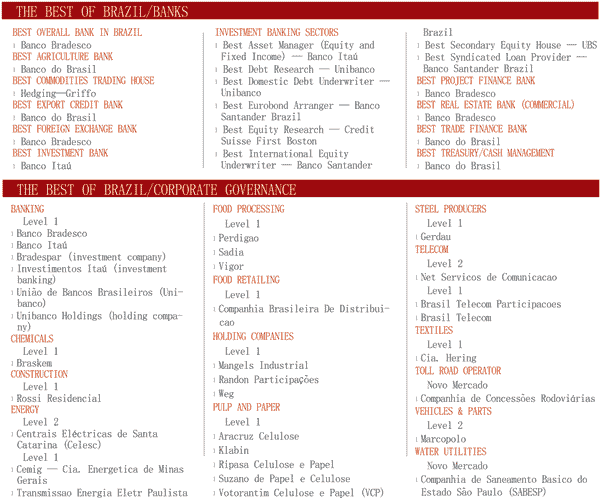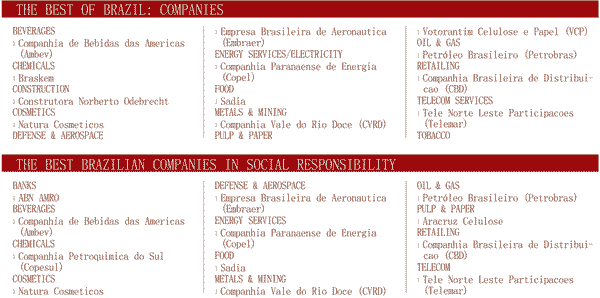A Little Bit of Give and Take
Brazils new leader continues to impress the international financial community with his steadfast commitment to economic reform and his skillful navigation of some difficult political terrain.

The politically savvy administration of Brazils left-leaning president, Luiz Incio da Silva (Lula), is carefully nudging controversial reforms of the social security and tax systems through Congress as it garners popular support at home. Major restructuring of both of these complex financial systemsconsidered essential to restoring the international financial communitys faith in the Brazilian economyshould clear Congress by years end even if all the specific details are not implemented.
If the giant Latin nations complex and time-consuming legislative process delays passage of the reforms until the first quarter of 2004, analysts at Standard & Poors are still optimistic that the revisions will improve the countrys fiscal condition and relieve its debt burden. Theres definitely progress. Theres a determination behind the government to move ahead with these reforms, says Lisa M. Schineller, associate director in the sovereign group at Standard & Poors in New York City. Lulas popularity is quite high, and there is growing public support for these reforms.
One unexpected obstacle the newly elected administration is up against is the emergence of a political scandal and subsequent congressional investigation. Last month a congressional commission began investigating the removal between 1996 and 1999 of $30 billion from the country via accounts at Banestado, or Banco do Estado de Paran, the former state bank of Paran. More than 300 politicians and businesspeople are reportedly involved in the transactions, which involved the transfer of money, through so-called CC5 accounts, to accounts outside of Brazil. Analysts are concerned that Congress may become sidetracked and focus on the political scandal rather than zero in on the financial reforms needed to invigorate Brazils stagnant economy.

Theres the fear that Congress will be distracted from the reform process, and the media will converge on the issue, says Peter Shaw, managing director of Latin American banks at Fitch Ratings in New York City. Shaw says that since the 1990s it has been legal in Brazil to invest capital abroad, but the investigation is centering on the legality of these transfers. I think theres a feeling that the government will keep this investigation under control, Shaw adds.
The investigation has echoes of the early 1990s when political scandals helped derail attempts by former president Fernando Henrique Cardoso to push reforms through Congress. This time around, though, the administration may be helped by the fact that the Congressional opposition parties, the people most likely to use the investigation as a vehicle for blocking the reforms, may have members embroiled in the scandals. Lulas deftness in handling opposition politicians, both within his own leftist Workers Party and other political groups, since he assumed power on January 1 also has analysts confident that he can maneuver the reforms through Congress.
The PT [Lulas Partido dos Trabalhadores] is a structured party, and discipline is being used, says Schineller, adding that party members can show discontent during debates but are expected to toe the party line when it comes time to vote. Lulas administration has actively worked to expand its coalition base in both chambers of Congress and has secured support from the Partido do Movimento Democratico Brasileiro (PMBD). It will be difficult for the [opposition] to be very obstructive it wont play well with voters, adds Schineller. Theres a window of opportunity to get these reforms through now.
Both the tax and social security reforms emerged last month with a stamp of approval from constitutional committees in the lower house, called the Chamber of Deputies. They must now pass through special commissions in the chamber before moving onto the Federal Senate, which analysts at Barclays Capital believe will happen this fall.
Ambitious Reforms
The administrations reform of Brazils financially troubled social security system aims to align the more generous public sector regimewhere men can retire at age 58 and women at age 53 with substantial pensionswith the private sector pension system.
The tax reform bill seeks to simplify a cumbersome tax system and reduce distortions that have hurt the competitiveness of Brazilian businesses both at home and abroad.

|
|
|
The tax reform bill also attempts to simplify the unwieldy value-added tax (VAT) on goods and services by unifying the tax across Brazils 27 states and the federal district as well as cutting the number of VAT brackets. Right now there are 27 states with different rates on different products its an administrative nightmare, says Schineller. An important move in the right direction is a value-added tax with unified rates across the states.
Schineller admits that the negotiating process among 27 state government officials to decide which products and services will be subject to which tax brackets will take timepossibly until 2005 or even 2006. But we think its a move in the right direction because it will improve the competitiveness and productivity of businesses, she adds.
Another proposal that some critics dont like is a proposal to make a so-called check tax permanent. Now implemented on a temporary basis, the tiny tax is levied whenever a deposit or withdrawal is made from a Brazilian banks checking account.
The tax helps to capture revenue from income people gain through the underground economy and also helps Brazilian tax authorities combat tax evasion by matching a persons banking activity against the income they report on their annual taxes.
We view it as a distortionary tax, but the government needs it right now for the revenue it produces, Schineller says.
Meanwhile, the countrys central bank gambled last month that inflation will continue to inch downward when it lowered its benchmark interest rate, the Selic, for the first time since last July. Monthly inflation figures have declined from a high of 3% in November 2002 to 0.61% in May, according to Barclays Capital in New York City.
I think youll see more interest rate cuts in the next few months, says Mario Mesquita, chief economist for Brazil at ABN AMRO Brazil in So Paulo. It will be good for the economy, which will pick up in 2004.
Listening To the People

Brazils blossoming corporate social responsibility movement received a welcome boost with Lulas election.
In keeping with his leftist stance, the Brazilian president is committed to encouraging socially responsible corporate behavior. A clear sign of this commitment is his appointment of Oded Grajew as one of his four presidential advisers. Grajew is a prominent Brazilian businessman and founder and president of The Ethos Institute of Business and Social Responsibility in So Paulo, the countrys leading corporate social responsibility group.
Another sign of Lulas desire to spread the power sharing beyond the traditional political institutions and bridge the gap between corporations and society is his creation of a social and economic development council. The council, which held its first meeting in February, aims to gather input from all members of society, including business, labor and non-governmental organizations.
I feel this government is receptive to civil society and wants to set up a dialogue with all institutions, says Rebecca Raposo, executive director at The Group of Institutes, Foundations and Enterprises (GIFE) in So Paulo. The Workers Party has a tradition of listening to different points of view. I think they will push the [corporate social responsibility] agenda forward as they go further down the line.
As one of South Americas first associations of grantmakers, GIFE helps unite private organizations that fund or operate social, cultural and environment projects in Brazil. While Brazil has had a tradition of private and even corporate philanthropy for the past 10 to 20 years, for the corporate movement to push beyond projects that benefit the community or the arts is relatively new. Many companies have a foundation for projects for the community, says Nelmara Arbex, manager of knowledge management and international relations at The Ethos Institute. But a program with coherent corporate values and transparency against corruption is less prominent.
That has changed in the past two to three years as some Brazilian companies have started to develop comprehensive social agendas rather than simply fulfilling a social duty with donations to community groups. And more companies are setting up separate foundations whose social agendas and gift giving is more transparent, adds Raposo.
The next step will be for more Brazilian corporations to follow the lead of US and European firms that have set up comprehensive social responsibility programs that envelope all of a companys stakeholdersfrom employees to suppliers to consumers to community groups.
The Ethos Institute has taken advantage of that shift of consciousness in Brazilian boardrooms. Since its creation by a group of businesspeople in 1998, the institutes roll call of member companies has grown from 11 to more than 730. In Europe, the movement has been pushed by the government, and in the United States the market is the most important source, says Arbex. But here it is society groups that are pushing businesses. Society has lots of fire.

Paula L. Green



